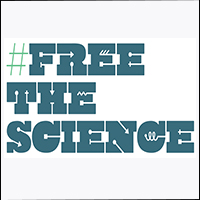 Since The Electrochemical Society’s inception in 1902, the Society has stood for the advancement of electrochemical and solid state science and technology. As part of this mission, ECS is working to Free the Science by making all content from ECS journals free and fully accessible to the public: an initiative that is gaining traction and attention in the scholarly publishing community.
Since The Electrochemical Society’s inception in 1902, the Society has stood for the advancement of electrochemical and solid state science and technology. As part of this mission, ECS is working to Free the Science by making all content from ECS journals free and fully accessible to the public: an initiative that is gaining traction and attention in the scholarly publishing community.
UCL’s Town Hall meeting on Plan S
On January 8, the University College London (UCL) held a town hall meeting to discuss the principles of Plan S, a plan that supports open access initiatives like Free the Science, which aims to make all research funded by public grants provided by cOAlition S funders openly available by 2020.
The plan has since received some backlash and concerns from the academic and scholarly publishing communities, including UCL, the host of the Plan S discussion.
UCL’s Plan S consultation response
While UCL fully endorses open access as the direction of travel for scholarly publishing, concerns are high regarding certain aspects of the plan, including “the heavy-handed approach Plan S is presenting.”ee asking for wholesale change in advance of any study of the implications of the changes … this is very bad project management practice.”
In addition, there is apprehension about leaping into the unknown when it comes to exploring Plan S-compliant business models: “The fact that over 80% of journals would currently not be Plan S compliant means that we face a crisis unless journals change their business models. How quickly can this be done? And how can change be made until we know how commercial publishers will react?”
Further, there is alarm over what compliance will look like for publishers transitioning to open access: “What does a transformative deal look like? What is the measure? Who measures? All the description in Plan S is too vague to be helpful.”
Read UCL’s full response here.
Robert Kiley’s response to UCL
Robert Kiley, head of open research at the Wellcome Trust and cOAlition S representative, was among the attendees. Following the UCL Town Hall meeting, Kiley shared a follow up response to UCL’s Plan S consultation response as a contribution to the ongoing discussion over Plan S.
“Firstly, I’d like to commend UCL for the principled stand it has taken on open access and open science more generally,” said Kiley, in his response. “This stand has been supported by concrete actions as seen in the development of UCL Press – where all content is made freely available – and the fact that UCL was one of the first UK universities to sign the San Francisco Declaration on Research Assessment (DORA) and implement this through its academic career framework.”
Kiley, nevertheless, expressing disappointment in UCL’s response to Plan S.
“As a species, we are facing huge problems – climate change, epidemic preparedness, etc. – and to begin to address these we need to ensure that the research we fund is fully accessible and usable,” said Kiley, advocating for a world where research is no longer behind a paywall.
Recognizing the difficulty some publishers may encounter in the transition to open access, Kiley said, “For this reason, the Plan S implementation guidance makes clear that, for a time-limited period, we will continue to support subscription publishers who develop transformative models to move to OA.”
Leaders in open access
As part of Kiley’s response to concerns brought up about the impact of Plan S on learned society publishers, some publishers, like ECS, have already gotten the ball rolling.
“It is interesting to see a number of new initiatives being trialed, such as The Electrochemical Society’s Free the Science initiative,” said Kiley, among others like the “Subscribe to Open” model being implemented by the not-for-profit publisher Annual Reviews and various other consortia models.
In addition to Kiley’s recent statement, The Royal Society’s Publishing Director and newly appointed OASPA Board Member Stuart Taylor also called the Society’s work towards full open access particularly innovative in a recent interview.
“The Electrochemical Society is looking to move to a platinum open access model, so they don’t have to charge APCs; have a look at their Free the Science project. I think that’s a bold and exciting initiative,” said Taylor.
The Free the Science initiative represents ECS’s commitment to making all science open and discoverable to everyone: a long-term vision for transformative change in the traditional models of communicating scholarly research. With this action, the Society is leading its field in the open science and open access scholarly communication movements.
“Ultimately, for Plan S to be successful we need the initiative to be supported globally,” concluded Kiley.
That is why in support of open access, ECS has participated in International Open Access Week 2018, for the fourth consecutive year, making over 151,000 scientific articles and abstracts free and accessible to everyone. In 2018 in particular, Open Access Week created record-breaking surges in access to ECS content, drawing in over 36,440 new visitors to the ECS Digital Library.
Free the Science Week
Join ECS this year for the 3rd annual Free the Science Week taking place April 1-7. Throughout this week, the Society will take down its paywall to the entire ECS Digital Library—making over 151,000 scientific articles and abstracts free and accessible to everyone—offering the world a preview of what complete open access to peer-reviewed scientific research will one day look like!


